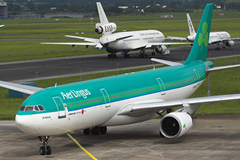Aviation policy scrutinised
 The Northern Ireland Affairs Committee’s inquiry into aviation policy is examining its impact on the economy, tourism and recreational and business travel. agendaNi reports.
The Northern Ireland Affairs Committee’s inquiry into aviation policy is examining its impact on the economy, tourism and recreational and business travel. agendaNi reports.
Air transport and connectivity are “vital” in meeting Northern Ireland’s commitments to increase exports, tourism revenues and attract more foreign direct investment.
This was the consensus view given to the Northern Ireland Affairs Committee, which is currently conducting an inquiry into an air transport strategy for the province.
Announced on 23 March, the inquiry has heard six rounds of oral evidence including from Minister of State for Transport Theresa Villiers, Managing Director of Belfast International Airport John Doran, Chief Executive of Belfast City Airport Brian Ambrose, Director of CBI Northern Ireland Nigel Smyth and ministers Arlene Foster and Danny Kennedy. Written submissions ended on 16 April and oral evidence is ongoing.
The CBI believes that urgent action is needed to deal with the crowding pressures at Heathrow, bus provision to and from Belfast City and International is adequate, and domestic air passenger duty needs to be reduced so that Northern Ireland can compete with Dublin.
The inquiry revealed that the Department for Regional Development has been working with the UK Department for Transport on the possibility of devolving aviation policy. When pressed by MP Oliver Colvile on Theresa Villiers’ willingness to consider devolution if it was requested by the Executive, Danny Kennedy said he wanted to await the publication of her department’s draft transport policy framework.
That was published on 12 July and does not refer to devolving aviation powers to the province. It does, however, pledge to help the airports outside south east England by offering bilateral partners (i.e. airlines) open access to airports (including in the devolved regions). This would facilitate inward investment in new routes and extra choice for business and passengers without necessarily having to secure reciprocal access for UK airlines to the airports of the other country, the draft framework states.
The committee also heard that Northern Ireland is seeking new routes to Germany, Canada and the Middle East.
Air passenger duty (APD) for long-haul flights from Northern Ireland was reduced to the short-haul rate of £12 in economy and £24 in business class in November 2011. This has been “invaluable” to the Belfast to New York route, Foster said. There are plans to reduce that to zero, she added. However, short-haul rates rose to £13 and £26 on 1 April 2012, making domestic charges more expensive than long-haul. The domestic APD is €3 in the Republic. When asked by Sylvia Hermon whether the Executive would find the £60 million required to ensure that Northern Ireland had power over setting APD on domestic flights, Danny Kennedy said that the effect on the block grant would be too severe at the moment.
On access to Derry airport, Kennedy pointed to the £75 million upgrade to the Derry to Coleraine railway. However, he did not mention its closure until April 2013, three months into the City of Culture year. The road through Templepatrick to Belfast International won’t be upgraded in the foreseeable future, he told Lady Hermon; she finds the route inconvenient when leaving her sons to the airport to travel to the university.
Lord Reg Empey’s Airports Amendment Bill calls for the ring-fencing of slots to ensure adequate services between hub and regional airports. However, European law currently prevents this. Villiers told the committee that the Government would raise it with the Commission to try to get a dispensation for the UK. Kennedy told the committee that Empey has been getting positive signals from Europe on this proposed measure.
Committee Chair Laurence Robertson has indicated that it is “half or two-thirds” of the way through the inquiry, which suggests that a report will come before Parliament early next year.





